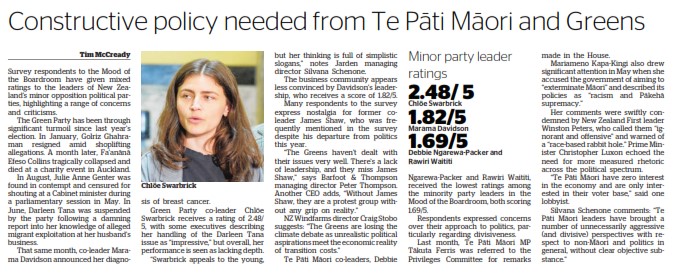Mood of the Boardroom: Greens, Te Pāti Māori political leaders face mixed ratings (NZ Herald)
Survey respondents to the Mood of the Boardroom have given mixed ratings to the leaders of New Zealand’s minor opposition political parties, highlighting a range of concerns and criticisms.
The Green Party has been through significant turmoil since last year’s election. In January, Golriz Ghahraman resigned amid shoplifting allegations. A month later, Fa’anānā Efeso Collins collapsed and died at a charity event in Auckland.
In August, Julie Anne Genter was found in contempt and censured for shouting at a Cabinet minister during a parliamentary session in May. In June, Darleen Tana was suspended by the party following a damning report into her knowledge of alleged migrant exploitation at her husband’s business.
That same month, co-leader Marama Davidson announced her diagnosis of breast cancer.
Green Party co-leader Chlöe Swarbrick receives a rating of 2.48/ 5, with some executives describing her handling of the Darleen Tana issue as “impressive” but overall, her performance is seen as lacking depth.
“Swarbrick appeals to the young, but her thinking is full of simplistic slogans,” Jarden managing director Silvana Schenone notes.
The business community appears less convinced by Davidson’s leadership, who receives a score of 1.82/5.
Many respondents to the survey express nostalgia for former co-leader James Shaw, who was frequently mentioned in the survey despite his departure from politics this year.
“The Greens haven’t dealt with their issues very well. There’s a lack of leadership, and they miss James Shaw,” Barfoot & Thompson managing director Peter Thompson says.
Another CEO adds, “Without James Shaw, they are a protest group without any grip on reality.”
NZ Windfarms director Craig Stobo suggests: “The Greens are losing the climate debate as unrealistic political aspirations meet the economic reality of transition costs.”
Te Pāti Māori co-leaders Debbie Ngarewa-Packer and Rawiri Waititi received the lowest ratings among the minority party leaders in the Mood of the Boardroom, both scoring 1.69/5.
Respondents expressed concerns over their approach to politics, particularly regarding divisiveness.
Last month, Te Pāti Māori MP Tākuta Ferris was referred to the Privileges Committee for remarks made in the House.
Mariameno Kapa-Kingi also drew significant attention in May when she accused the Government of aiming to “exterminate Māori” and described its policies as “racism and Pākehā supremacy.”
Her comments were swiftly condemned by New Zealand First leader Winston Peters, who called them “ignorant and offensive” and warned of a “race-based rabbit hole.” Prime Minister Christopher Luxon echoed the need for more measured rhetoric across the political spectrum.
“Te Pāti Māori have zero interest in the economy and are only interested in their voter base,” one lobbyist said.
Silvana Schenone comments: “Te Pāti Māori leaders have brought a number of unnecessarily aggressive (and divisive) perspectives with respect to non-Māori and politics in general, without clear objective substance.”



